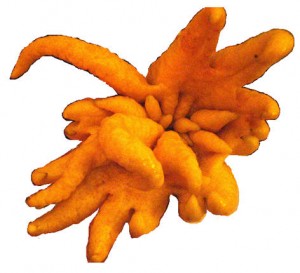Objects of Beauty
Have you ever seen a Buddha’s Hand Lemon? It’s an extraordinary thing, somewhat floral in form, with curling tentacles. But from the side it has a squid-like shape, and resembles a prop in a sci-fi movie.
 I held one yesterday for the first time. I was fascinated by its waxy surface and variations in color, its subtle aroma, and mostly, the odd beauty of all those fingers reaching from Buddha’s palm. It was elegant and creepy. I loved it.
I held one yesterday for the first time. I was fascinated by its waxy surface and variations in color, its subtle aroma, and mostly, the odd beauty of all those fingers reaching from Buddha’s palm. It was elegant and creepy. I loved it.
This morning I opened my eyes and thought: How would I write if I broke all my fingers?
Oh, I’m sure there was a connection between my strange waking thought and that bizarre organic object. Still – what would you do if pursuing what you love is suddenly impossible? Or at the very least, significantly hampered?
Doing What We Love
I’ve never broken a finger. Toes, yes, and too many times to count. When I’ve broken toes, I’ve been unable to do my daily walking which I love. But stubborn as I am, I tend to give the toe a rest for a week or two, get fed up, then throw on open-toed sandals and do whatever I can – not as far or as fast – but something.
Two or three years back, my younger son broke a finger playing ball with his buddies. His damaged digit was appropriately scanned and splinted, and because he loves to make art – he still made art, even with that finger sticking out uncomfortably. He had to change the way he held his pencil, and revise the movement of his arm across a page. There was no break in his rhythm – or his productivity – only a shift in how he got things done.
Loving What We Do
When we love to do something, we pursue it with whatever we can, when we can – for the pleasure of it, and the keen sense of being fully ourselves in the process.
But what about all the hours we spend doing what we don’t love? Not just the everyday tasks that sustain our household infrastructure – cooking and cleaning and driving – but the activities that put food on the table? The way we earn our keep?
Some of the jobs I’ve worked I genuinely disliked, but tolerated. Others, I liked well enough to open my mind to something entirely new. I came to love what I was doing – for awhile, anyway. So can we, in fact, learn to love what we do?
Adapting
Last evening, we were invited to share Thanksgiving with friends. Their children – four of them – have flown the nest. Three were home for the holiday as were both my sons. The other mother was wistful (we both were), and listening to our kids laugh together we knew how fortunate we were, and that we’ve done our most important job.
While we’ve always worked for pay outside the home (or in a home office, in my case), raising our children has been the core “profession” all these years. Adapting to an empty nest is no small feat, as is accepting our kids as adults. It is strange, beautiful, and not quite real, a bit like that eccentric lemon.
But if change is the one constant, isn’t the ability to adapt a critical skill? Doesn’t it open up the possibility for something new?
Doing and Loving
This morning I think of broken fingers. If I couldn’t type or hold a pencil, I would write with my voice. And if my voice grew strained, I would tap with my toes. If that were impossible, I imagine I would have to blink my words.
Whatever is broken will knit together again and if it doesn’t, if we’re smart, we’ll find something new to do and to love. Because isn’t life all about doing, whatever you can with whatever you have – and loving, whether it’s adventure or creating or channeling the best of yourself into those who populate your world? And even if part of that process leaves us feeling as though we’re breaking, perhaps we aren’t. Perhaps we’re growing, and adapting.
© D A Wolf
“[E]ven if part of that process leaves us feeling as though we’re breaking, perhaps we aren’t. Perhaps we’re growing, and adapting.”
I needed to read this today for reasons that are too complex and personal to share just yet. But thank you for putting into words this feeling of cracking wide open.
I remember when Julie Andrews lost her voice, and I thought it was one of the most horrifying things. But she’s become a celebrated author of children’s books since with her daughter. What an amazing and admirable example of someone who lived through it.
“[E]ven if part of that process leaves us feeling as though we’re breaking, perhaps we aren’t. Perhaps we’re growing, and adapting.”
Like Kelly, I gravitated toward these two lines. I find some solace in these words after a very challenging week of emotions I wasn’t prepared to experience. Thanks BLW.
Perhaps an impermanent drink under the Bhodi Tree with a twist from Buddha’s Hand Lemon would help heal whatever distortions ail us… of fingers, toes and everything in between.
Not sure whether this is bordering on sensationalism, but have you seen the YouTube video of this Chinese man who played the piano with his feet because he lost his arms in an accident? It took him two years to learn to do so I think. The human ability to adapt and overcome is breathtaking sometimes.